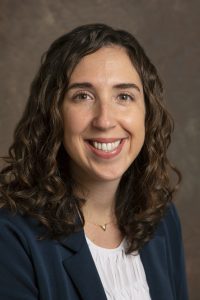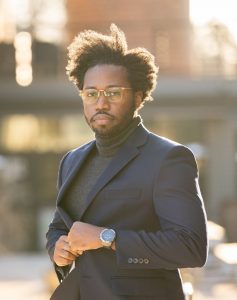The National Institutes of Health (NIH) have awarded a 5-year grant of approximately $3.75 million to a research team piloting a new program for people in recovery from opioid use disorder (OUD).
The one-hour, individualized intervention, “Disclosing Recovery,” is guided by a trained facilitator within the context of an OUD treatment program. It is designed to support people in deciding whether and how to share details about their opioid use or treatment with important people in their lives.

“One of the most overlooked barriers to recovery from OUD is social isolation,” says Valerie Earnshaw ‘11 Ph.D., the project’s PI. “Individuals in recovery from OUD often face a destructive cycle where opioid use leads to isolation, and isolation increases the risk of continued opioid use and overdose. Disclosure — sharing OUD history or treatment — can break this cycle by facilitating social connection during OUD treatment.”
The project is headed by Earnshaw, an associate professor of human development and family sciences at the University of Delaware (UD), and Zachary Collier, assistant professor in UConn’s Research Methods, Measurement, and Evaluation program in the Neag School of Education. Collier brings a deep expertise in data modeling to their collaboration, while Earnshaw boasts years of research in health inequities and stigma.
Earnshaw says the inspiration for “Disclosing Recovery” came from her work with the Boston Children’s Hospital Adolescent Substance Use & Addiction Program in 2015. There, she was conducting a qualitative study of adolescents and their parents. She noticed that patients’ disclosures to their parents were “all across the board” in terms of both the adolescents’ approaches and parents’ reactions.

“And then, at the same time, I had somebody in my life share with me that they were going to be receiving inpatient treatment for a substance use disorder,” she says. “They disclosed this in such an advanced and amazing way that left me with no other response than to say, ‘I love you, I support you, and if there’s anything I can do to help this next stage go easier on you, I’d really love to do that.’
“So I had this contrast: a mixed bag of disclosures in our research study and a super skilled disclosure in my personal life,” she continues. “And I looked at that and thought, this seems teachable, but nobody else is teaching this yet.”
Grounded in this experience, “Disclosing Recovery” encourages participants to thoughtfully plan potential disclosures. It includes role-playing practices for each participant’s personal “best case” and “worst case” disclosure scenarios and prompts participants to write their own scripts.
Reflection opportunities encourage participants to plan out all the particulars and consider what they want out of their disclosure: Why are they thinking about disclosing? What exactly do they want to disclose? What format do they want their disclosure to take – an in-person conversation, or a letter or email? Do they feel ready to make the disclosure now, or do they want to wait until later in their recovery?
The intervention itself has been well received in pilot testing. In the next phase, the researchers will evaluate its long-term efficacy, following 480 participants. The team hopes that the data will indicate improved treatment outcomes for individuals in recovery from OUD who practiced disclosure through “Disclosing Recovery.”
“We hypothesize that this could be due to changes in relationships,” Earnshaw says. “Based on our pilot data, we think that folks who receive our intervention may receive, for example, more social support. They might become closer to the people they are disclosing to, and they also may receive less stigma from those people.”
In turn, the researchers hope that their intervention could lead to improved public health outcomes, including greater OUD treatment success and fewer overdoses. The state of Delaware, where the intervention is being tested, has a relatively high overdose rate, so the team is conscious of the real-world stakes.
Collier is eager to work with the data to reveal hidden trends and gain a complex understanding of how various mediators and moderators impact participants’ outcomes. Variables like participants’ gender and age, and even the person they are disclosing to – whether it is a parent, a significant other, or an employer, for instance – will each impact the data, and Collier’s job is to interpret this.
“I’m always excited about cases where you’re able to say, ‘Alright, so this particular variable is having a direct effect on an outcome – but hey, there’s this whole outside background characteristic that has never been explored before,’” he says. “Now that we have the data to explore it, we can see that this background characteristic is providing some sort of indirect effect as well. The finite mixture models we’ll be using allow us to calculate an overall effect of those variables.”
Collier and Earnshaw have been research partners since they were both faculty at UD, where they met at a speed dating–style event encouraging faculty collaborations. They clicked immediately, bonding over their shared interest in making the world a better place through socially responsible research. Since their first joint project, where they worked together to test an intervention for clinicians in Malaysia related to HIV stigma, they’ve been academically inseparable.
It may be kismet that Collier ended up teaching at Earnshaw’s alma mater, UConn, where he leads the Methods for Unstructured and Difficult to use Data (MUDD) lab. His work focuses on interpreting data in social science and education – especially cleaning messy datasets and allowing researchers to draw valid conclusions from datasets with missing variables.
“Disclosing Recovery” is also supported by UConn Professor Lisa Eaton, from the Department of Human Development and Family Sciences, who chairs the project’s data safety and monitoring board.
“We definitely could not do this project without our collaborations at UConn,” Earnshaw says.



